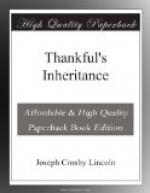The next day passed somehow, though it seemed to her as if it never would, and early the following forenoon came Solomon himself. The man of business was driving an elderly horse which bore a faint resemblance to its owner, being small and thin and badly in need of a hairdresser’s services. If the animal had possessed whiskers and could have tugged at them Thankful was sure it would have done it.
Solomon tugged at his own whiskers almost constantly during that forenoon. He and Mrs. Barnes visited the “Captain Abner place” and Solomon inspected every inch of its exterior. For some reason or other he absolutely refused to go inside. His conversation during the inspection was, for the most part, sniffs and grunts, and it was not until it was ended and they stood together at the gate, that he spoke to the point, and then only because his companion insisted.
“Well!” said Thankful.
Mr. Cobb “weeded.”
“Eh?” he said.
“That’s what I say—eh? What are you goin’ to do about that mortgage, Mr. Cobb?”
More weeding. Then: “Waal, I—I don’t cal’late to want to be unreasonable nor nothin’, but I ain’t real keen about takin’ no mortgage on that property; not myself, I ain’t.”
“Well, it is yourself I’m askin’ to take it. So you won’t, hey? All right; that’s all I wanted to know.”
“Now—now—now, hold on! Hold on! I ain’t sayin’ I won’t take it. I—I’d like to be accommodatin’, ’specially to a relation. But—”
“Never mind the relation business. I found out what you think of relations afore you found out I was one. And I ain’t askin’ accommodation. This is just plain business, seems to me. Will you let me have two thousand dollars on a mortgage on this place?”
Mr. Cobb fidgeted. “I couldn’t let you have that much,” he said. “I couldn’t. I—I—” he wrenched the next sentence loose after what seemed a violent effort, “I might let you have half of it—a thousand, say.”
But Thankful refused to say a thousand. That was ridiculous, she declared. By degrees, and a hundred at a time, Solomon raised his offer to fifteen hundred. This being the sum Mrs. Barnes had considered in the first place—and having asked for the two thousand merely because of her judgment of human nature—she announced that she would think over the offer. Then came the question of time. Here Mr. Cobb was firm. Three years—two years—he would not consider. At last he announced that he would take a one-year mortgage on the Barnes property for fifteen hundred dollars; and that was all he would do.
“And I wouldn’t do that for nobody else,” he declared. “You bein’ my relation I don’t know’s it ain’t my duty as a perfessin’ Christian to—to help you out. I hadn’t ought to afford it, but I’m willin’ to go so far.”
Thankful shook her head. “I’m glad you said, ‘PROFESSIN’ Christian.’” she observed. “Well,” drawing a long breath, “then I suppose I’ve got to say yes or no. . . . And I’ll say yes,” she added firmly. “And we’ll call it settled.”




